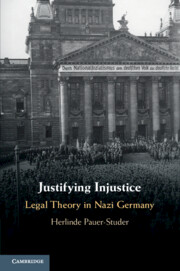Book contents
- Justifying Injustice
- Justifying Injustice
- Copyright page
- Dedication
- Contents
- Acknowledgments
- Note on Translations and Reference Policy
- 1 Introduction
- 2 From the Weimar Republic to the Third Reich
- 3 The Führer State
- 4 National Socialist Criminal Law
- 5 Racial Legislation
- 6 Police Law
- 7 The SS Jurisdiction
- 8 The Moralization of Law in National Socialism
- Biographical Notes
- Bibliography
- Subject Index
- Name Index
2 - From the Weimar Republic to the Third Reich
Published online by Cambridge University Press: 21 September 2020
- Justifying Injustice
- Justifying Injustice
- Copyright page
- Dedication
- Contents
- Acknowledgments
- Note on Translations and Reference Policy
- 1 Introduction
- 2 From the Weimar Republic to the Third Reich
- 3 The Führer State
- 4 National Socialist Criminal Law
- 5 Racial Legislation
- 6 Police Law
- 7 The SS Jurisdiction
- 8 The Moralization of Law in National Socialism
- Biographical Notes
- Bibliography
- Subject Index
- Name Index
Summary
This chapter explores the normative background for the Weimar Republic’s demise, paying particular attention to the shortcomings in the Weimar Constitution (governance by presidential emergency decrees, based on Article 48; and the absence of a constitutional court with clear competencies for judicial review) that abetted democracy’s collapse. We closely examine the controversy in fall 1932 over whether the president, as the “guardian of the constitution,” was ex officio beyond judicial control, as Carl Schmitt claimed, or if such a viewpoint contradicted the spirit of the democratic Weimar Constitution as Hans Kelsen claimed. Kelsen’s critique of Schmitt’s views on the normative position of the president’s normative position and powers in late 1932 was one of the last forceful theoretical defenses of Weimar democracy.
Keywords
Information
- Type
- Chapter
- Information
- Justifying InjusticeLegal Theory in Nazi Germany, pp. 16 - 44Publisher: Cambridge University PressPrint publication year: 2020
